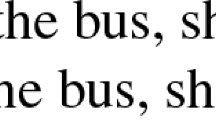Abstract
The modal primitivist who takes a sentential possibility operator ‘◊’ as her only modal resource can provide adequate representations of the familiar concepts of weak, strong and global supervenience. The primitivist representations of these concepts can be applied to provide adequate interpretations of speciflc supervenience theses which will be considered. Moreover the modal primitivist is no better and no worse placed than the genuine modal realist to present supervenience as a simple and unifled notion. Therefore, Lewis is unjustified in claiming that a genuine modal realist approach to the analysis of the concept of supervenience is superior to a modal primitivist approach.
Similar content being viewed by others
References
Blackburn, Simon: 1984, Spreading the Word, Clarendon Press, Oxford.
Kim, Jaegwon: 1984, ‘Concepts of Supervenience’, Philosophy and Phenomenological Research XLV, 153–76.
Kim, Jaegwon: 1987, ‘“Strong” and “Global” Supervenience Revisited’, Philosophy and Phenomenological Research XLVIII, 315–26.
Lewis, David: 1986a, On The Plurality of Worlds, Basil Blackwell, Oxford.
Lewis, David: 1986b, Philosophical Papers Vol II, Basil Blackwell, Oxford.
Author information
Authors and Affiliations
Additional information
Thanks to Jim Edwards, Alex Miller, Pat Shaw and an anonymous reader for suggestions and comments on earlier versions of this material.
Rights and permissions
About this article
Cite this article
Divers, J. Supervenience for operators. Synthese 106, 103–112 (1996). https://doi.org/10.1007/BF00413616
Issue Date:
DOI: https://doi.org/10.1007/BF00413616




